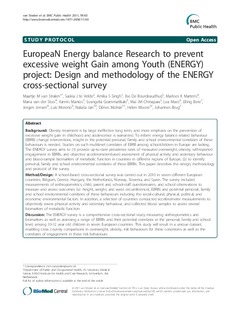| dc.identifier.citation | van Stralen, M. M., Velde, S. J. T., Singh, A. S., De Bourdeaudhuij, I., Martens, M. K., van der Sluis, M., . . . Brug, J. (2011). EuropeaN Energy balance Research to prevent excessive weight Gain among Youth (ENERGY) project: Design and methodology of the ENERGY cross-sectional survey. Bmc Public Health, 11. doi: 65 | en_US |
| dc.description.abstract | Background: Obesity treatment is by large ineffective long term, and more emphasis on the prevention of excessive weight gain in childhood and adolescence is warranted. To inform energy balance related behaviour (EBRB) change interventions, insight in the potential personal, family and school environmental correlates of these behaviours is needed. Studies on such multilevel correlates of EBRB among schoolchildren in Europe are lacking. The ENERGY survey aims to (1) provide up-to-date prevalence rates of measured overweight, obesity, self-reported engagement in EBRBs, and objective accelerometer-based assessment of physical activity and sedentary behaviour and blood-sample biomarkers of metabolic function in countries in different regions of Europe, (2) to identify personal, family and school environmental correlates of these EBRBs. This paper describes the design, methodology and protocol of the survey. Method/Design: A school-based cross-sectional survey was carried out in 2010 in seven different European countries; Belgium, Greece, Hungary, the Netherlands, Norway, Slovenia, and Spain. The survey included measurements of anthropometrics, child, parent and school-staff questionnaires, and school observations to measure and assess outcomes (i.e. height, weight, and waist circumference), EBRBs and potential personal, family and school environmental correlates of these behaviours including the social-cultural, physical, political, and economic environmental factors. In addition, a selection of countries conducted accelerometer measurements to objectively assess physical activity and sedentary behaviour, and collected blood samples to assess several biomarkers of metabolic function. Discussion: The ENERGY survey is a comprehensive cross-sectional study measuring anthropometrics and biomarkers as well as assessing a range of EBRBs and their potential correlates at the personal, family and school level, among 10-12 year old children in seven European countries. This study will result in a unique dataset, enabling cross country comparisons in overweight, obesity, risk behaviours for these conditions as well as the correlates of engagement in these risk behaviours. | en_US |
